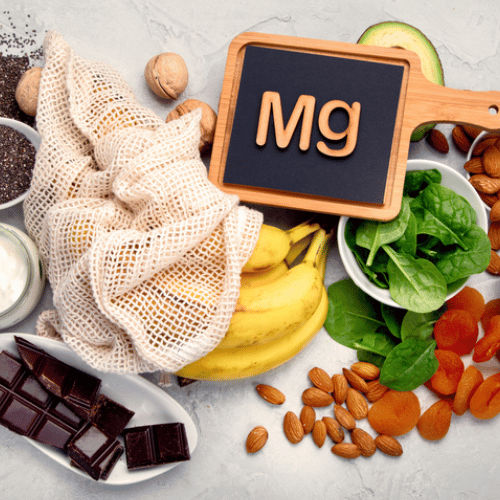Have you ever been jolted awake by the sudden, agonizing grip of nighttime leg cramps? Or found yourself halted mid-stride, muscles seizing in rebellion? Leg cramps are not just painful; they're downright mutinous, hijacking your daily routine and, when they strike at night, even your precious slumber. The ongoing debate is as heated as the cramps themselves: Magnesium or Potassium - which is the hero your muscles cry out for?
In this informational blog post, we're diving deep into the muscle mystery of leg cramps. We'll unravel the intricate roles of magnesium and potassium in muscle health and whether popping supplements can truly banish those crampy specters. Plus, we'll arm you with actionable tips to keep your electrolytes in harmonious balance with the power of diet and lifestyle choices. So, lace up, and let's embark on a journey to cramp-free living!
Key Takeaways: Unraveling the Mystery of Leg Cramps
- The Culprits Behind the Cramp: Ever wonder why your legs seize up unexpectedly? It could be due to this unsuspected trio: dehydration, muscle overuse, and a seesaw of electrolyte levels.
- Mineral Magic: Think of magnesium and potassium as your leg's best friends. They might just be the secret to calming those cramps, although science hasn't quite given us the definitive nod yet.
- Stay Fluid, Stay Fit: Keep those leg cramps at bay with a winning strategy: guzzle up the H2O, make exercise your ally, and don't let underlying health gremlins lurk unchecked. Your legs will thank you!
Banish the Twitch: Unraveling the Mystery of Leg Cramps

Have you ever been jolted awake by an invisible force gripping your leg with the ferocity of a vice? You're not alone! A staggering 60% of adults and 7% of children are caught up in this battle with the dreaded leg cramp. These sudden, involuntary muscle contractions are more than a nuisance; they're a full-blown rebellion in your limbs, complete with intense pain and muscle twitching.
But what's the culprit behind these muscle pains? The usual suspects include:
- Dehydration: Your muscles are crying out for water!
- Muscle Overuse: Like any hard worker, your muscles can get overworked.
- Electrolyte Imbalances: The delicate balance of minerals in your body is vital.
Your leg muscles are prone to these cramps, staging their protest when least expected. But you can arm yourself with an arsenal of preventative tactics:
- Hydration: Drink up to keep those muscles content.
- Stretching: Show your muscles some love with regular stretching.
- Exercise: Keep the peace with consistent, gentle exercise.
- Medical Attention: Address any underlying conditions that might be stirring the pot.
- Supplementation: Sometimes, a peace offering of magnesium or potassium can keep the cramps at bay.
However, if you find yourself in the throes of persistent and severe nighttime leg cramps that keep you awake and leave you weary, it's time to call in the professional. Don't let these nocturnal nuisances rob you of your rest—seek medical intervention to restore order to your legs.
Remember, staying vigilant and proactive is your best defense against the tyranny of leg cramps. Keep your body well-hydrated and your muscles limber, and don't hesitate to seek professional help when the situation escalates. Your legs will thank you!
More On Dehydration
So, dehydration can lead to leg cramps due to decreased blood flow to your muscles, causing electrolyte imbalances, mainly sodium and potassium, which are essential for proper muscle function. Exercise-induced cramps can be particularly troublesome as they can occur during or after physical activity and may be exacerbated, as we've said, by dehydration and the resulting electrolyte imbalances.
Now you know that maintaining adequate hydration supports electrolyte balance and prevents painful cramps. Inadequate potassium, magnesium, and calcium due to dehydration may often result in muscle cramps.
Muscle Overuse
Muscle overuse, defined as prolonged and repetitive use of a muscle or group of muscles, can result in fatigue, strain, and injury. When muscles are overused, they can become fatigued and lack the necessary nutrients and electrolytes for proper function, causing imbalances and muscle spasms or cramps. Overuse can also lead to muscle fatigue and the accumulation of waste products, such as lactic acid, which contribute to muscle cramps.
Preventing leg cramps caused by muscle overuse involves ensuring adequate hydration, regular stretching, warming up, avoiding overexertion, and applying heat to relax muscles.
Electrolyte Imbalances
Electrolyte imbalances are centered around these key players:
- sodium
- potassium
- magnesium
- calcium
Also, be aware that leg cramps can sometimes result from high blood pressure, as it may cause imbalances in the body. These imbalances may lead to muscle cramping, dizziness, and alterations in bodily fluids due to vomiting, diarrhea, or perspiration.
A blood test that measures electrolyte levels in the body is typically conducted in conjunction with other tests evaluating overall kidney function and medical history.
The Role of Magnesium in Muscle Cramp Prevention
Magnesium is pivotal in regulating muscle function, and its deficiency is often associated with muscle cramps. Despite this correlation, scientific research regarding the efficacy of magnesium supplementation as a preventative measure for cramps has yet to reach a definitive conclusion.
The biological functions of magnesium encompass neuromuscular transmission and the facilitation of muscle contractions. Insufficient levels of this mineral may predispose individuals to an increased incidence of muscle cramps. Although magnesium supplements are extensively promoted to alleviate leg cramps, current empirical evidence supporting their effectiveness is limited but growing.
Magnesium Deficiency and Muscle Function
A magnesium deficiency can manifest in several neuromuscular symptoms, including but not limited to:
- Muscle cramps
- Spasms
- Tremors
- Fatigue
- Weakness
Magnesium is integral to various physiological processes, including regulating muscle function, neural communication, energy metabolism, and the balance between muscle contraction and relaxation. Inadequate magnesium levels can lead to involuntary muscle contractions or spasms, commonly experienced as cramps.
Factors contributing to magnesium deficiency may include chronic diarrhea, excessive urination, habitual alcohol consumption, extensive burns, and recurrent vomiting. These conditions can significantly deplete the body's magnesium stores, leading to neuromuscular complications.
Magnesium Supplementation
While magnesium supplements are often marketed for cramp prevention, their effectiveness is still debated. Common adverse effects of oral magnesium supplementation include:
- diarrhea
- nausea
- vomiting
- flatulence
- constipation
Despite some studies showing no significant benefits for cramp prevention, magnesium supplementation may be helpful for some individuals, particularly those with magnesium deficiencies.
Research Findings on Magnesium and Cramps
Research findings on magnesium and cramps are mixed, with some studies showing no significant benefits. The Cochrane Review determined that evidence regarding magnesium supplementation for exercise- or disease-related muscle cramps is not reliable.
Several studies published in the Journal of the American Medical Association, Nutrition Journal, and the National Prescribing Service found little evidence to support the effectiveness of magnesium supplements for leg cramps.
The Role of Potassium in Muscle Cramp Prevention
Potassium plays a pivotal role in muscular function, and its deficiency can lead to muscle cramps. In certain instances, supplementation may be advantageous, especially when targeting the root causes of deficiency, such as dehydration or electrolyte imbalances.
Nonetheless, akin to magnesium, empirical studies on the efficacy of potassium supplementation in alleviating cramps indicate that it may benefit a subset of individuals. In contrast, others may not experience the same benefits.
Potassium Deficiency
Potassium deficiency, clinically known as hypokalemia, can lead to muscle cramps due to its critical role in neuromuscular functions. Potassium is essential for regulating electrical activity in muscle cells, facilitating their contraction and relaxation. Insufficient potassium levels may hinder proper blood vessel dilation, subsequently reducing blood flow to muscles and potentially leading to the degeneration of skeletal muscle tissue.
The common etiologies of potassium deficiency include:
- Diuretic-Induced Excretion: Prescription medications that promote increased urination can lead to excessive loss of potassium.
- Gastrointestinal Losses: Conditions that cause vomiting or diarrhea and using laxatives can result in significant potassium depletion.
- Alcohol Consumption: High intake of alcohol may contribute to potassium deficiency.
- Excessive Sweating: Profound perspiration, particularly in athletes or during intense physical activity, can decrease potassium levels.
- Folic Acid Deficiency: A deficiency in folic acid may impair potassium absorption and retention.
- Antibiotic Use: Certain antibiotics have been associated with reduced potassium levels due to their effects on renal potassium handling.
Individuals at risk of hypokalemia must monitor their potassium intake and consult healthcare professionals for appropriate management strategies.
Potassium Supplementation
Potassium supplements can help address deficiency and may prevent cramps in some individuals. Some common side effects of potassium supplements include:
- Stomach upset
- Nausea
- Diarrhea
- Vomiting
- Intestinal gas
It’s important to consult a healthcare professional before starting any potassium supplementation to ensure proper dosage and to avoid potential side effects.
Research Findings on Potassium and Cramps
Research findings on potassium and cramps suggest that supplementation may be beneficial for some people. Studies have indicated that potassium, in conjunction with other electrolytes such as sodium and magnesium, may aid in the prevention of muscle cramps.
Potassium supplementation has also been shown to have a beneficial effect on reducing muscle cramp frequency. However, more research is needed to assess the efficacy of increased potassium intake in alleviating muscle cramps.
Comparing Magnesium and Potassium for Leg Cramp Relief
Although both magnesium and potassium have significant roles in muscle function, the research regarding their effectiveness in preventing cramps shows varied results. Magnesium is involved in neuromuscular transmission and muscle contraction, and deficiency may increase the likelihood of muscle cramps. However, some studies have found no significant benefits of magnesium supplementation for cramp prevention.
On the other hand, potassium is essential for muscle contractions, and deficiency can lead to cramps. Some research suggests that potassium supplementation may be beneficial for certain individuals, particularly when addressing underlying causes of deficiency like dehydration or electrolyte imbalances.
Ultimately, the most effective approach to leg cramp relief may depend on the individual and their specific needs. It is crucial to address any underlying causes, such as dehydration, muscle overuse, or medical conditions, in order to prevent and treat leg cramps effectively.
A balanced intake of magnesium and potassium through diet, hydration, and exercise can help maintain proper electrolyte balance and prevent muscle cramps for many individuals.
Dietary Sources of Magnesium and Potassium
Keeping a balanced electrolyte level through diet is crucial in preventing muscle cramps. Consuming foods rich in magnesium and potassium can help support muscle function and prevent cramps due to deficiencies. Some foods high in magnesium include:
- Almonds
- Spinach
- Cashews
- Black beans
- Edamame
- Avocado
- Dark chocolate
- Yogurt
Potassium-rich foods include:
- Bananas
- Oranges
- Cantaloupes
- Honeydew
- Apricots
- Grapefruit
- Dried fruits such as prunes, raisins, and dates
- Beans
- Lentils
- Chickpeas
- Soybeans
- Peanuts
- Mustard spinach
- Pumpkin
- White beans
- Winter squash
- Potatoes
- Leafy greens
- Prunes
- Tomato puree or juice
Foods Rich in Magnesium

Leafy greens, nuts, seeds, and whole grains are rich in magnesium, essential for proper muscle function. Including various magnesium-rich foods can help ensure adequate magnesium intake and prevent muscle cramps. Some examples of magnesium-rich foods are:
- Spinach
- Kale
- Swiss chard
- Almonds
- Cashews
- Whole grains like buckwheat and quinoa
Foods Rich in Potassium

Foods rich in potassium include:
- Bananas
- Apricots
- Lentils
- Potatoes
These foods are essential for maintaining muscle function and preventing cramps. Consuming potassium-rich foods like oranges, cantaloupes, honeydew, grapefruit, legumes, dried fruits, spinach, and tomato puree or juice can help support muscle function and prevent cramps due to deficiencies.
Other Strategies for Preventing and Treating Leg Cramps
In addition to ensuring a proper intake of magnesium and potassium, other strategies for preventing and treating leg cramps include:
- Staying hydrated
- Stretching and exercising regularly
- Addressing underlying medical conditions, such as thyroid or kidney disorders
- Passive stretching and massaging the affected muscle can offer relief from cramps
- Daily stretching of the calf muscles has been recommended as a preventative measure
Maintaining proper hydration and engaging in regular physical activity can also help prevent muscle overuse and cramps.
Hydration
Adequate hydration is key to maintaining electrolyte balance and preventing muscle cramps. Drinking adequate amounts of water, especially during physical activity, can help ensure that the body has enough fluids to support muscle function.
Additionally, maintaining proper hydration can help prevent electrolyte imbalances that can lead to muscle cramps, particularly in pregnant women. It is important to consult a healthcare professional before taking any dietary supplements, including magnesium and potassium, to ensure proper dosage and avoid potential side effects.
Stretching and Exercise

Consistent stretching and exercise can aid in preventing muscle overuse and cramps. Stretching aids in muscle relaxation relieves involuntary contraction, and can be carried out both before and after physical activity to avert cramps. The most beneficial stretches for avoiding leg cramps include:
- Standing calf stretch
- Lying quad stretch
- Frog pose
- Kneeling quad stretch
To avoid muscle cramps, it is suggested to exercise routinely and maintain an appropriate level of fitness.
Addressing Underlying Medical Conditions
Addressing underlying medical conditions, such as diabetes, thyroid disorders, and kidney disease, can help prevent cramps. For example, thyroid disorders like hypothyroidism can cause muscle weakness, aches, and cramping, and treatments such as medication, surgery, or hormone replacement therapy with levothyroxine may alleviate leg cramps associated with thyroid disorders.
Various factors, including pregnancy-associated leg cramps and kidney disease, can cause leg cramps. In the case of kidney disease, imbalances in fluid and electrolytes, nerve damage, and blood flow issues can contribute to the problem. Consulting a healthcare professional to diagnose and treat underlying conditions can help prevent and treat leg cramps effectively.
When to Consult a Healthcare Professional
If leg cramps continue or worsen, or if an underlying medical condition or deficiency is suspected, consulting a healthcare professional is advisable. Indications that leg cramps may be severe enough to warrant medical attention include:
- intense discomfort
- leg swelling
- redness or changes in skin texture
- muscle weakness
- frequent recurrence
- failure to respond to self-care
A healthcare professional can diagnose potential deficiencies or underlying conditions through blood tests and may recommend appropriate treatments or interventions to help prevent and treat leg cramps effectively.
Wrapping Up
Dealing with leg cramps can be challenging, but understanding the role of minerals like magnesium and potassium in muscle health is a significant first step in managing them. While the scientific community is still exploring how much magnesium and potassium supplements can directly prevent cramps, we know that keeping a healthy balance of electrolytes, staying hydrated, and regular exercise are critical factors in keeping those cramps at bay.
Did you know electrolyte powders and liquids are a big hit among people seeking hydration and cramp-prevention solutions? They're quite the trend! Our review article delves into the top five electrolyte products available on Amazon. These products are flying off the shelves, selling around 120,000 units monthly – many satisfied customers are finding relief! Curious to know more? We’ve got you covered with our in-depth review. Just click the link below to discover more about these popular supplements.
It's also super important to remember that sometimes, cramps can be a sign of underlying health issues, like thyroid or kidney problems. So, if those leg cramps just won't quit or seem to worsen, it's a good idea to chat with a healthcare expert. They can help pinpoint specific causes and get you on the right track to relief.
Thanks for diving into our paper on “Should I Take Potassium or Magnesium for Leg Cramps?” We hope this summary informed you and inspired you to take positive steps towards managing leg cramps. Stay healthy, and keep smiling!
Frequently Asked Questions
Which is better for leg cramps, magnesium or potassium?
Magnesium appears to be more effective than potassium in reducing the frequency of leg cramps, particularly for pregnant women.
What is the best vitamin for leg cramps?
A vitamin B12 complex or magnesium supplement is likely the best option for relieving leg cramps.
How much magnesium should I take per day for leg cramps?
300 mg of magnesium is recommended daily for leg cramps to reduce their frequency and intensity.
What foods are rich sources of magnesium and potassium?
Almonds, spinach, cashews, black beans, edamame, bananas, oranges, cantaloupes, and potatoes are all excellent sources of magnesium and potassium.
When should I consult a healthcare professional for leg cramps?
If leg cramps persist or worsen, or if you suspect an underlying medical condition, it is advisable to consult a healthcare professional.
Thanks for taking this journey to explore which is better for leg cramps: Magnesium or Potassium? And, if you want to know if electrolyte powders really do work, you should check out our article, "Breaking Down The Buzz: Do Electrolyte Powders Really Work?" - it contains significant information to add to your library of knowledge!
Also, please return soon to check out our next review of another incredible supplement – we’re always looking out for YOU!
*We are not qualified medical advisors. The content here is only based on our personal opinions and should NOT be used as a substitute for a healthcare professional's advice!











Member discussion